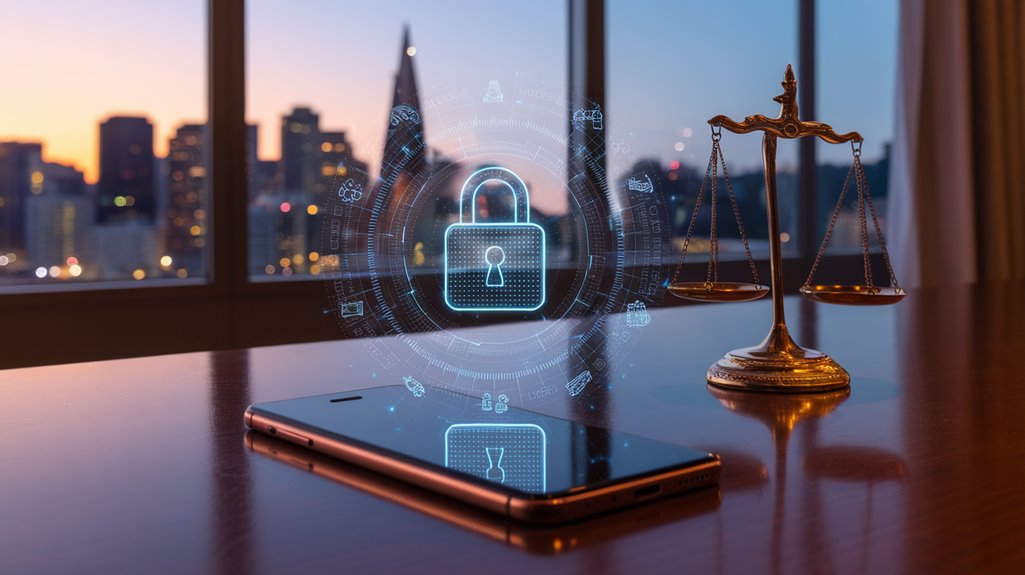Attorney-client privilege protects confidential communications between Bay Area residents and their lawyers. This legal protection covers written, oral, and digital exchanges, ensuring private conversations stay private. However, certain actions like sharing information with others or using unsecured digital platforms can waive this protection. Modern challenges include cloud storage, email security, and evolving court decisions. Understanding these key aspects helps residents maintain their legal rights and confidentiality in today's digital world.
Key Takeaways
- Attorney-client privilege protects all confidential communications between Bay Area residents and their lawyers, including digital exchanges and initial consultations.
- Bay Area clients have exclusive control over waiving privilege, but sharing information with outside parties can nullify protection.
- Digital communications pose increased risks, with email miscommunication accounting for 27% of privilege waivers in the region.
- Recent Ninth Circuit rulings affect Bay Area residents by requiring communications to primarily serve legal purposes for privilege protection.
- Cloud storage and collaboration platforms require specific security measures to maintain privilege protection for Bay Area clients.
The Foundation of Attorney-Client Privilege in California

Trust forms the bedrock of attorney-client privilege in California. Under Evidence Code 954, all confidential communications between clients and licensed attorneys remain protected from disclosure in legal proceedings. This protection covers both written and oral exchanges, including initial consultations before formal hiring.
As legal technology advances, the scope of evolving privilege extends to emails, digital messages, and virtual meetings. The protection applies whether clients pay for services or not, as long as they seek legal advice from California-licensed attorneys or those reasonably believed to be authorized practitioners. Even after the attorney-client relationship ends, these communications stay confidential. The law also safeguards conversations through authorized intermediaries like paralegals, ensuring thorough protection for all legitimate legal consultations.
Key Components That Bay Area Residents Must Understand
For Bay Area residents seeking legal counsel, understanding the core aspects of attorney-client privilege helps protect their rights. Client control remains at the heart of this privilege, as clients have sole authority to waive or maintain confidentiality. However, privilege waiver can occur through various actions, including sharing protected information with outside parties or using legal advice as part of a defense strategy. Moreover, it’s crucial for clients to recognize that the boundaries of attorney-client privilege can shift based on their actions and disclosures. In situations involving selfdefense claims in the bay area, clients must be particularly cautious, as discussions related to these claims may intersect with other legal considerations. By ensuring that communication remains within the confines of the attorney-client relationship, individuals can better safeguard their legal rights and strategies. Additionally, clients should be aware that certain circumstances, such as domestic partnerships in the bay area, may introduce complexities regarding privilege. If legal counsel involves discussions about rights and responsibilities within these partnerships, clients must tread carefully to avoid inadvertently waiving their privilege. Ultimately, fostering open and honest communication with their attorney while respecting the limits of confidentiality will empower clients to navigate their legal challenges more effectively.
| Action | Result | Impact |
|---|---|---|
| Client disclosure | May waive privilege | Protection lost |
| Criminal activity | Loses protection | No privilege |
| Inadvertent sharing | Federal Rule 502 helps | Can be protected |
| Fee disputes | Waiver may occur | Limited scope |
| Fraud involvement | Privilege lost | No protection |
Understanding these components helps Bay Area residents maintain their privileged communications and avoid unintentional waivers that could compromise their legal protections. By being aware of these legal nuances, individuals can take proactive steps to safeguard their confidential information in various situations. This awareness is especially crucial in cases involving accommodations, such as requests for emotional support animals in housing, where miscommunication or lack of understanding could lead to unnecessary disputes. Ensuring clear and informed communication helps residents protect their rights while fostering a fair and legally compliant living environment. Furthermore, individuals should familiarize themselves with their legal rights, including the importance of the miranda warning and your rights, if they find themselves in situations involving law enforcement. This knowledge not only empowers residents but also reinforces their ability to navigate complex interactions while ensuring their rights are upheld. By prioritizing legal literacy, Bay Area residents can better advocate for themselves and create a supportive community where everyone’s rights are respected.
Digital Communications and Privilege Protection

Digital communication presents unique challenges for attorney-client privilege in the Bay Area's tech-driven environment. As residents increasingly rely on emails, texts, and messaging apps for legal correspondence, protecting digital footprints becomes vital. While electronic communications with attorneys maintain privilege when seeking legal advice, common practices can accidentally waive this protection.
Simple actions like forwarding emails, using public Wi-Fi, or including unnecessary third parties in conversations can lead to privacy breaches. Even informal elements such as emojis or casual language don't invalidate privilege, but the communication must clearly show legal intent. Bay Area residents should be particularly careful with smartphone features like auto-fill and quick replies, which can accidentally share privileged information with unintended recipients. Using secure channels and marking communications as privileged helps maintain confidentiality.
Common Misconceptions Among Local Tech Companies
While Bay Area tech companies demonstrate sophistication in many areas, they often misunderstand the scope and application of attorney-client privilege. This misunderstood privilege leads to common mistakes in digital communications and data handling practices.
Common digital risks stem from incorrect assumptions about privilege protection:
- Labeling routine business emails as "privileged" without actual legal advice content
- Sharing attorney communications through unsecured platforms like public Slack channels
- Allowing tech support teams to access privileged information without proper authorization
- Assuming privilege only applies to formal documents, overlooking texts and voice messages
These misconceptions can result in unintended privilege waivers, particularly when companies use collaboration tools without proper legal guidance. Tech firms must recognize that privilege depends more on the intent to seek legal advice than the communication format used.
Maintaining Privilege in Modern Business Environments

The rise of digital workplaces requires Bay Area companies to adapt their attorney-client privilege practices to modern communication tools. Legal teams must establish clear protocols for secure messaging platforms and implement strict access controls to protect privileged conversations. In-house counsel should regularly train employees on proper digital communication methods and document handling to maintain confidentiality in virtual work environments.
Digital Communication Best Practices
Modern business communication requires careful attention to protect attorney-client privilege in virtual environments. Law firms and clients must use secure messaging platforms with strong encryption protocols to safeguard confidential information. This includes using password-protected email systems and enabling multi-factor authentication for cloud-based tools.
Essential digital communication practices include:
- Using encrypted email clients for all privileged communications
- Labeling messages clearly with "Confidential: Attorney-Client Privileged"
- Storing privileged communications in secure, designated folders
- Tracking user access through system logs
Businesses should avoid sending sensitive information through personal messaging apps and regularly update their software to prevent security breaches. Clear labeling and proper organization of digital communications help maintain privilege while ensuring efficient collaboration between attorneys and clients.
Securing In-House Legal Teams
Building on secure digital practices, organizations must address specific challenges facing in-house legal teams to maintain attorney-client privilege. In house strategies need to clearly separate legal advice from business discussions, especially when attorneys serve multiple roles. Companies should limit privileged communications to employees directly involved in legal matters.
Legal compliance requires careful attention to the purpose of communications. Organizations must guarantee discussions with in-house counsel primarily seek legal guidance rather than business advice. Courts examine these communications closely, so companies should avoid marking routine business documents as privileged. Additionally, organizations must train employees about proper communication channels and restrict access to legal discussions. This helps prevent accidental privilege waivers through unnecessary sharing or improper disclosure to third parties.
Critical Exceptions Every Client Should Know
Understanding attorney-client privilege exceptions helps clients protect their legal rights. Bay Area residents should know that certain situations can void their confidential communications with attorneys. The crime-fraud exception removes protection when legal services are used to commit crimes. Third-party disclosure can eliminate privilege if non-essential people are present during attorney meetings.
Key exceptions that void attorney-client privilege include:
- Using attorney services to knowingly commit fraud or criminal acts
- Sharing privileged information with outside parties or through unsecured digital channels
- Communications focused on business advice rather than legal counsel
- Situations involving child welfare or public safety concerns
Clients should exercise caution in their communications and understand these limitations to maintain their privilege protections effectively.
Best Practices for Preserving Confidentiality

Maintaining attorney-client privilege requires consistent attention to security practices and confidentiality protocols. Law firms in the Bay Area protect client information through encrypted communications, secure document storage, and strict access controls. They implement confidentiality agreements with staff and external vendors who handle sensitive materials.
Regular privilege training helps both attorneys and clients understand proper handling of protected information. This includes avoiding discussions in public spaces, using secure digital platforms, and properly labeling privileged documents. Firms also maintain detailed logs of client interactions and implement data retention policies to manage sensitive information throughout the case lifecycle. When potential breaches occur, immediate action includes changing credentials, securing systems, and engaging forensic experts to prevent future incidents.
Recent Court Decisions Affecting Bay Area Residents
Recent court rulings have substantially changed how attorney-client privilege works for Bay Area residents and businesses. Court interpretations, especially in the Ninth Circuit, have made it harder to keep communications private when they serve both legal and business purposes.
Key privilege implications from recent decisions include:
- Communications must now have a mainly legal purpose to stay protected, not just a mixed business-legal purpose
- Internal company investigations need clear attorney direction to maintain privilege
- Tax-related advice faces stronger scrutiny and often loses protection
- Startup founders can't claim privilege over corporate communications, as shown in the Theranos case
The changes particularly affect tech companies and startups in the Bay Area, where business and legal advice often overlap in daily operations.
Practical Steps to Safeguard Your Legal Communications

Given the evolving legal landscape, Bay Area residents and businesses must take specific steps to protect their attorney-client communications. Using secure messaging platforms with end-to-end encryption is essential for sensitive legal discussions. All communications should clearly indicate "Privileged and Confidential" status, while avoiding overuse of these labels.
Regular encryption audits help guarantee that security measures remain effective. Clients should understand the risks of using unencrypted email and provide informed consent before transmitting sensitive information through less secure channels. Multi-factor authentication adds an extra layer of protection for all communication tools. Additionally, written agreements should outline approved communication methods and security protocols. These practical steps help maintain confidentiality and protect privileged information in an increasingly digital world.
The Future of Privilege in Silicon Valley's Digital Age
Silicon Valley's rapid growth creates new challenges for protecting attorney-client communications at scale across digital platforms. Companies struggle to maintain legal privacy as cloud storage systems become more interconnected and accessible to various stakeholders. The future of privilege protection in the Bay Area will depend on finding the right balance between technological innovation and established legal safeguards.
Digital Privacy At Scale
Digital transformation has reshaped how Bay Area attorneys protect client confidentiality. With rising cybersecurity threats and complex privacy regulations, law firms must adapt their practices to safeguard sensitive information. Recent data shows that digital consent and security measures are essential as 65% of law firms face cyberattacks targeting privileged data.
Key digital privacy challenges include:
- Email miscommunication accounts for 27% of privilege waivers
- Shared platforms like Slack create new risks for data exposure
- AI tools used by 40% of Bay Area firms need strict security protocols
- Third-party access to metadata threatens confidentiality
Law firms now require stronger digital safeguards, including encryption and multi-factor authentication. California's 2023 privacy laws have set new standards for protecting legal communications, making digital security a top priority for attorneys serving Bay Area clients.
Cloud Storage Legal Challenges
The rise of cloud storage has created new legal challenges for attorney-client privilege in Bay Area law firms. While cloud platforms offer advanced security features, they also introduce new privilege risks that require careful management. Courts generally maintain privilege protection when lawyers use reasonable security measures, even if data breaches occur.
Law firms must focus on cloud compliance by implementing strong security protocols, including encryption and multi-factor authentication. Recent court decisions show that judges consider "reasonable efforts" more important than perfect security. When using services like Dropbox or Google Drive, attorneys must prove they took adequate precautions to protect client data. This often means using password-protected links and following bar association guidelines for data protection, especially in high-risk cases common to Silicon Valley's tech sector.
Frequently Asked Questions
Can Attorney-Client Privilege Protect Communications With Paralegals and Legal Assistants?
Attorney-client privilege can protect paralegal communications and interactions with legal assistants when they work under attorney supervision. This protection applies to emails, phone calls, and written communications. However, the legal advice must originate from or involve an attorney's input to qualify for privilege. If paralegals or legal assistants act independently without attorney oversight, these communications lose their privileged status. Clear documentation and attorney supervision are essential.
How Long Does Attorney-Client Privilege Last After the Attorney-Client Relationship Ends?
While some might assume attorney-client privilege ends when representation stops, it actually continues indefinitely. Duration factors include both voluntary termination and death of either party. The privilege survives unchanged after the relationship ends, with the same privilege limits applying. Only the client or their legal representatives can waive it, even after death. Communications remain protected unless they involve future crimes or preventing imminent harm to others.
Does Privilege Apply to Conversations With Potential Lawyers Who Weren't Ultimately Hired?
Attorney-client privilege generally applies to potential attorney conversations even if the lawyer isn't hired, as long as specific conditions are met. The person must be seeking legal advice, and both parties should expect confidentiality during the consultation. However, privilege exceptions considerations include situations where third parties are present or if the discussion involves future crimes. The protection ends if the attorney declines representation and communication continues afterward.
Can Family Members Be Present During Privileged Conversations Without Breaking Confidentiality?
When Jane brought her elderly mother to meet with an attorney about estate planning, she learned an important lesson about family presence during legal meetings. Generally, having family members present during attorney conversations breaks confidentiality unless they serve an essential role. For example, relatives may maintain privilege if they act as interpreters, assist disabled clients, or provide necessary expertise. However, casual family observers typically destroy attorney-client privilege and create confidentiality concerns.
Does Attorney-Client Privilege Still Apply if You Haven't Paid Your Lawyer?
Attorney-client privilege remains fully intact even with unpaid services. The ethical and legal duty to maintain confidentiality doesn't depend on payment status. Once an attorney-client relationship is established, all private communications stay protected regardless of billing disputes. Legal ethics require lawyers to keep client information confidential even if they haven't been paid. Non-payment may affect continued representation, but it never voids the privilege protecting past communications.
Conclusion
Attorney-client privilege acts as a fortress protecting sensitive legal communications in the Bay Area's fast-moving digital landscape. While technology evolves, the core principles remain steady. Bay Area residents and businesses must actively guard their privileged communications through smart practices and awareness of current laws. With proper understanding and careful steps, clients can maintain this essential shield that keeps their legal matters confidential and secure.
